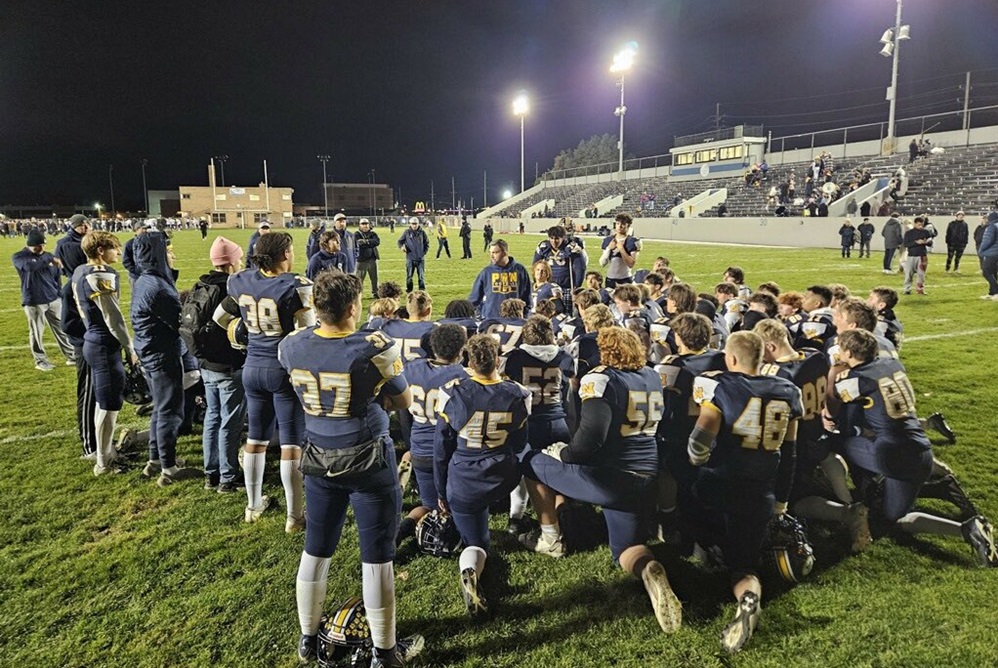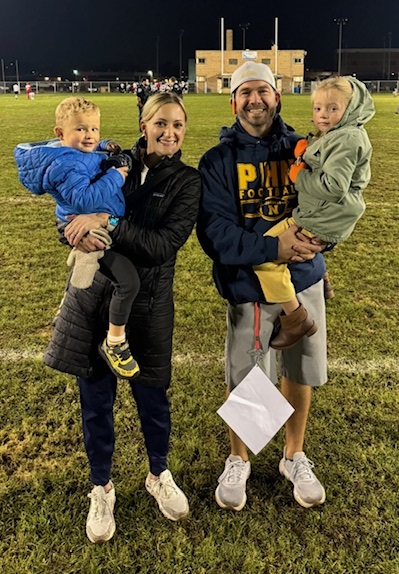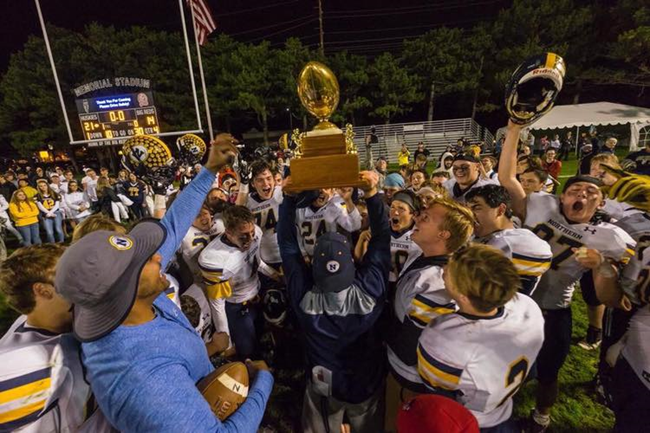
CAP Begins 2014-15 on Record Pace
By
Geoff Kimmerly
MHSAA.com senior editor
August 22, 2014
Gretchen Mohney has come to recognize coaches who think they already know it all.
Then she begins a Coaches Advancement Program lesson by describing an orange banging around inside a fishbowl – a metaphor to explain the brain inside an athlete’s skull when he or she suffers a concussion.
Her most powerful lessons have moved pupils to tears. And it’s always gratifying to witness the “Aha” moments that make the CAP educational experience so powerful.
“My favorite is when they admit that they’ve done something wrong, and they want to know how to do something better,” said Mohney, a highly-respected trainer and strength and conditioning coach who also serves as an instructor for the athletic training program at Western Michigan University. “It’s a pretty awesome moment when they realize there’s more to learn.”
More current and aspiring coaches than ever before are taking advantage of that opportunity as the 2014-15 school year kicks off.
Since this training year began July 25 at Battle Creek Lakeview, 273 current or aspiring coaches have completed CAP sessions – nearly twice as many coaches as this point a year ago and with the last session of August planned for Saturday at New Buffalo. That makes this the busiest start in CAP history, according to MHSAA assistant director Kathy Vruggink Westdorp, who joined the MHSAA staff in 2004, developed CAP for the 2004-05 school year and continues to oversee the program.
This first month’s total attendance also represents 33 percent of the 818 total CAP units completed at high schools and the MHSAA office during all of 2013-14.
“I think the big thing continues to be word of mouth that this is a quality program,” said Hamilton athletic director Jerry Haggerty, a CAP instructor for nine years. “It’s good for all coaches of all experience levels.”
Setting a standard
Since the program’s inception, nearly 6,300 coaches have completed at least the first-level unit. More than 1,000 have advanced through CAP 4.
The CAP program is broken into six levels, each addressing a set of topics:
- CAP 1: Coaches Make the Difference, The Coach as Teacher, Sports Medicine and First Aid.
- CAP 2: Effective Communication, Legal Responsibilities, Psychology of Coaching.
- CAP 3: Additional Coaching Responsibilities, Effectively Working with Parents, The Coach as Performer.
- CAP 4: Understanding Athletic Development, Strength and Conditioning, Preparing for Success.
- CAP 5: Healthy Living, Teaching Emotional Toughness, Resolving Conflicts in Athletics.
- CAP 6: Current Issues and Topics in Educational Athletics.
“Individuals who go through this have a better understanding of their philosophy, their school’s philosophy, their role and responsibility as well as the meaning behind MHSAA rules,” said Westdorp, a former principal, athletic director, teacher and coach in the Grand Rapids area who was named 2013 Coach Educator of the Year by the National Federation of State High School Associations (NFHS) for her work with the program.
She trains and evaluates all presenters and instructors, including those who last school year administered 1,238 CAP sessions at seven universities and colleges across both peninsulas.
The non-college CAP sessions are taught by 20 instructors who pride themselves on being available anywhere there’s interest. CAP has been presented at 10 Lower Peninsula schools over the last month, with Upper Peninsula sessions planned for this fall. August 9 was particularly busy – units were taught at Jonesville, Pontiac Notre Dame Prep and Riverview Gabriel Richard – but Westdorp sees the possibility of presenting at up to five sites on the same day.
Flexibility also is an option; a group of mostly non-school coaches took CAP 2 last week in Baldwin, and were able to complete the course over two days instead of one so they could do so without interrupting their fulltime jobs. For coaches working in schools, CAP units can qualify as continuing education credits with the State Department of Education.
Colleges and universities in Michigan are licensed to present up to five levels through their undergraduate or graduate studies, and the list of those who completed courses the last few years is filled with recognizable names of former high achievers on MHSAA courts and fields. Southwestern Michigan College in Dowagiac will offer courses for the first time this fall.
Certification in the program occurs after completion of CAP 1 and 2, and then after each subsequent unit, with those completing CAP 6 earning Masters Elite Certification.
The topics of CAP sessions “bleed” into each other, Mohney said, and come with plenty of first-person examples to make them relevant to coaches who then realize they aren’t alone facing issues most encounter.
“I talk to them because I’ve been there. … (I say,) ‘Now, let’s talk real.’ I place them in a real situation,” Mohney said. “’The biggest thing is you guys don’t have to know everything. You just need to coach, be aware of this, this and that. And these are some ideas to go about your plan so you can decrease your stress.’
“Any time a coach hears that, it’s a beautiful thing. Because I’m not sure what coach in high school is in coaching for the money.”
Raising the bar
Certainly, some of this month’s heightened CAP participation can be attributed to an MHSAA Representative Council action in March. Beginning Aug. 1, 2016, varsity head coaches hired for the first time at an MHSAA member school must have completed CAP 1 or CAP 2. Westdorp said some who wish to become head coaches in that near future are getting a jump by completing CAP courses now.
But that’s only a slice of the success story.
Haggerty has directed Hamilton’s athletic department for 15 years and said all of his coaches have taken either CAP 1 or 2. Many coaches take the courses on their own; others are required to do so by their athletic directors.
The Capital Area Activities Conference will offer CAP 1 three times this school year, with 100-150 coaches from their 20 member schools expected for each session. Others leagues and conferences are designing similar arrangements.
Michael Roy coached boys basketball at Lawton and girls hoops at Vicksburg and was certified under the predecessor to CAP – the MHSAA’s former Program for Athletic Coaches’ Education (PACE). He’s beginning his 13th year as Vicksburg’s athletic director, and after hosting several CAP classes over the years decided to begin the program himself this month.
“The need for knowledgeable and experienced coaches is greater than ever before. I thought if I was going to make it mandatory for my coaches to become CAP certified, that I needed to get CAP certified and lead by example,” Roy said. “The heart of any athletic team or program is its coaching staff. CAP is the surest way for coaches to access everything they need to know how to be a good coach. They learn the art of effective coaching through one of the best-designed coaches education programs in the country. CAP is second to none.”
Haggerty has spoken with athletic directors who have completed the program and then recognize when their coaches employ strategies learned at CAP sessions. An increasing pool of coaching candidates are heading into interviews with CAP certification in hand, and Westdorp has seen coaches bringing their CAP binders to practices to have those lessons available for quick reference. She’s also watched many CAP graduates using their skills at the highest level – the MHSAA Finals.
A comment by Duke men’s basketball coach Mike Krzyzewski sits at the front of those CAP binders: “A common mistake among those who work in sport is spending a disproportional amount of time on x’s and o’s as compared to time spent learning about people.”
Haggerty starts each session telling his pupils, “I do this for two reasons; one because I think it’s important to look at the non-x and o coaching realms; and two, because this is great fun for me.’”
And those coaches who come into CAP thinking they know enough? Mohney said most finish the first unit looking forward to beginning the next.
“CAP has a lot to do with understanding what you’re about, understanding your role and responsibility in athletics and your leadership role,” Westdorp said. “When I start programs, I talk about my work roles in life, and then (I tell coaches), ‘I want to tell you where I felt I was more influential, and that was as a coach.
“’And don’t ever forget it..’”
Click for more on the Coaches Advancement Program.
PHOTOS: These coaches, counter-clockwise from top left, all have completed at least one CAP unit: Bay City Western softball coach Rick Garlinghouse, St. Ignace girls basketball coach Dorene Ingalls, Ypsilanti Community boys basketball coach Steve Brooks, Beal City baseball coach Brad Antcliff and Mattawan softball coach Alicia Smith.

Rebuilt Culture Driving Success as Roelens Steps Away at Port Huron Northern
By
Paul Costanzo
Special for MHSAA.com
November 13, 2024
The spark that helped ignite the past decade of success for the Port Huron Northern football program came early in Larry Roelens’ tenure, and, ironically, during the one full season that the Huskies finished with a losing record under him.
 Northern, which had just three winning seasons over the previous 15, started 0-2 in 2015, but rattled off four straight wins under its first-year coach, who was noticing that things were changing for the better.
Northern, which had just three winning seasons over the previous 15, started 0-2 in 2015, but rattled off four straight wins under its first-year coach, who was noticing that things were changing for the better.
“I’ll be honest, Northern wasn’t in a very good state when I got the job,” Roelens said. “But for me and the guys that stayed around (on the coaching staff), I could never have done what I did without the guys on my staff. They’re like family to me and to my kids; they call them uncles. We went in with the mindset that we have to change the culture.
“We started 0-2 that first season, but then won four in a row. We lost three tough games to end the season, but that kind of changed the culture. We built on that, and the next year went 6-3.”
That next season was the beginning of the most successful stretch of football during the playoff era for the Huskies, as they made the postseason nine straight years, tripling the number of playoff appearances they had made during the 40 years prior.
The ninth postseason appearance was the last for Roelens, however, as he stepped down as Northern coach following a Division 2 District Semifinal loss to Warren De La Salle Collegiate on Oct. 24. He has accepted a position as assistant principal at the school, and administrators in the district are not allowed to hold head coaching positions.
“Honestly, that was a very hard decision to make for me,” Roelens said. “I went into education to be a coach and a teacher. But it was very much based on a family decision. I’ll be able to spend more time with my kids (Audrey, 5, and Brady, 3), and coach their teams.”
 Roelens leaves the Northern program in as good a place as it’s been, perhaps ever.
Roelens leaves the Northern program in as good a place as it’s been, perhaps ever.
He was 69-30 over his 10 seasons, with the nine playoff appearances and four Macomb Area Conference Blue titles. Northern also won four postseason games under Roelens.
Before he took over the program, Northern had three playoff appearances in program history – 1986, 1999 and 2010 – and a single postseason victory.
The program had not won eight games in a season since 1987, but did so four times under Roelens, including with a 10-2 mark in 2018, which matched the school record for wins.
“It’s pretty crazy,” said Northern senior quarterback Ty Fletcher. “He kind of morphed the program to what it is today. … I feel like, when he started getting into the playoffs and they had all those playoff appearances in (consecutive) seasons, that started that trend of winning football. Then we ended up staying there and being a competitive team.”
As it so often does, the success built an excitement around the program that found its way through the youth levels.
“We were all coming up through the youth teams, and we all stayed together on the freshman level, and we always talked about how everyone wants to play for Northern,” Fletcher said. “About how cool it was to play under the lights there.”
A lot of that excitement at the youth level has also been buoyed by a string of Division I college talent that has come through the program during Roelens’ time, led by Braiden McGregor. The defensive end was among the top recruits in the country in 2020 and played a key role on Michigan’s national title team. He is now playing for the New York Jets.
He wasn’t a one-off for the Huskies in terms of DI talent, as Luke Fletcher is now in his second year at Eastern Michigan, and current juniors Amir Morelan and Lincoln Watkins have both received Power 4 offers.
“Braiden’s class, we had a few kids that went on to play college football,” Roelens said. “That right there was proof that, even in a small town, they’re going to find you if you’re good enough. I think that pushed a lot of kids, because they started to understand that if you’re good enough and you work hard enough, they’ll find you.”
Roelens even being at Northern in the first place was a bit of a surprise for those in the area, as he was a star athlete at cross-town rival Port Huron High. Roelens played quarterback at Port Huron and went on to play baseball at Saginaw Valley State after graduating in 2004.
 He student taught at Northern during the 2009-10 school year, but even then he helped out with the Port Huron football program.
He student taught at Northern during the 2009-10 school year, but even then he helped out with the Port Huron football program.
His journey with Northern athletics began with assistant roles in the basketball and baseball programs later that year, and in the fall of 2010 he became the JV head football coach.
For four of the next five seasons he was on the Huskies staff, before taking over the program prior to the 2015 season.
With his new position, he’ll remain in the school and around the coaches and players in the program. And, while the thrill of coaching was something Roelens cherished, those relationships are what he’s valued most.
“I’ve been very blessed with the people I’ve had around me throughout those 10 years,” he said. “The support I had from Northern, the support of the parents, the Northern community, it’s been a blessing. My family, my wife and kids, they’ve all been tremendous.”
 Paul Costanzo served as a sportswriter at The Port Huron Times Herald from 2006-15, including three years as lead sportswriter, and prior to that as sports editor at the Hillsdale Daily News from 2005-06. He can be reached at [email protected] with story ideas for Genesee, Lapeer, St. Clair, Sanilac, Huron, Tuscola, Saginaw, Bay, Arenac, Midland and Gladwin counties.
Paul Costanzo served as a sportswriter at The Port Huron Times Herald from 2006-15, including three years as lead sportswriter, and prior to that as sports editor at the Hillsdale Daily News from 2005-06. He can be reached at [email protected] with story ideas for Genesee, Lapeer, St. Clair, Sanilac, Huron, Tuscola, Saginaw, Bay, Arenac, Midland and Gladwin counties.
PHOTOS (Top) Port Huron Northern football coach Larry Roelens, middle, is surrounded by his kneeling players during a postgame huddle. (Middle) Roelens holds daughter Audrey, and wife Kelsey holds son Brady on the field. (Below) Roelens hoists the Brick Fowler Trophy after a Northern win over rival Port Huron. (Photos courtesy of the Roelens family.)

